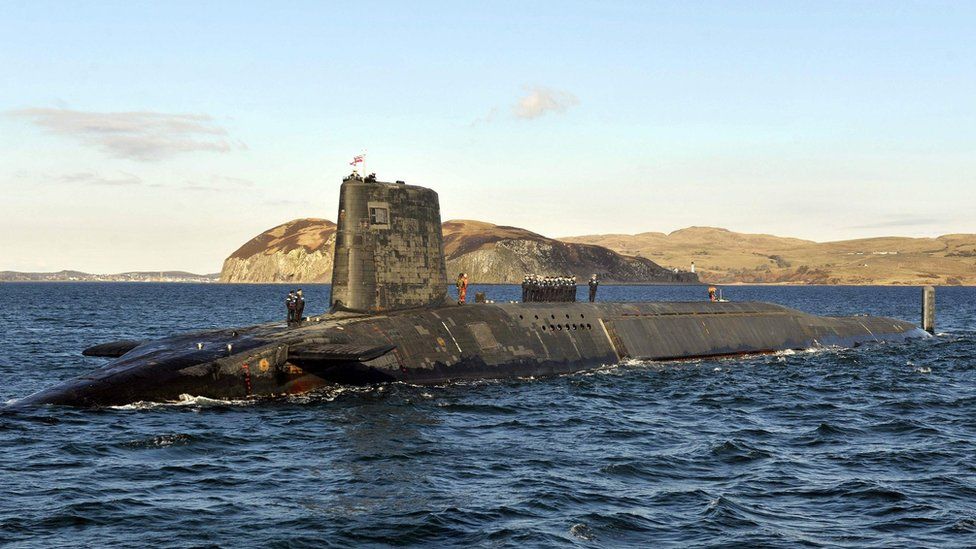Labour renews vow to keep nuclear weapons
- Published

Labour's support for keeping the UK's nuclear weapons is "non-negotiable," the shadow defence secretary has said.
But in a speech, John Healey also promised to "lead efforts to secure multilateral disarmament" if the party wins power.
Labour dropped its policy of unilaterally getting rid of the UK's nuclear weapons after then-leader Neil Kinnock lost the 1987 general election.
Many on the party's left remain vehemently opposed to that decision.
Former Labour leader Jeremy Corbyn - a long-time opponent of the UK's Trident submarine-based missile system and a vice president of the Campaign for Nuclear Disarmament (CND) - said in 2015 that he would never use it if he became prime minister.
Yet maintaining nuclear weapons remained a pledge in the party's 2019 election manifesto.
In a speech to the Royal United Services Institute think tank, Mr Healey emphasised that the party leadership under Sir Keir Starmer is far clearer in its backing of this than Mr Corbyn was.
"Labour's support for the UK's nuclear deterrent is non-negotiable. The matter is settled," he said.
He added that Labour wanted to see the UK "doing more to lead efforts to secure strategic arms limitation and multilateral disarmament".
Mr Healey also said the party's commitment to the NATO military alliance - which Mr Corbyn said in 2012 should be disbanded, but later argued should focus on reducing "tensions around the world" - is "unshakeable".
This isn't a change in policy, but it's a distinct change in tone.
Labour wants to make sure it gets a serious hearing on defence.
It knows that it needs its own position to be clear to be able to most effectively challenge the government's decisions (which is particularly important with the Integrated Review due soon).
That means definitively answering some of the questions which have been raised over recent years, especially around NATO and nuclear weapons.
Keeping Britain's nuclear weapons system has always been a divisive issue within Labour, but it is party policy.
That didn't change under Jeremy Corbyn, but his lifelong personal opposition to nuclear weapons - and his statement in 2015 that he would never use them - allowed Labour's commitment to be questioned.
Stating that it is "non-negotiable" ends that speculation, although it is unlikely to go down well with everyone in the party.
The government launched its Integrated Review last year, looking at the UK's long-term foreign policy and defence priorities.
Mr Healey said the review should "refocus our defence efforts on where the threats are, not where the business opportunities might be".
He also called for the review - which ministers have promised this month - to be published now, to end "confusion and speculation" about its contents.
He added that unless the review confirmed a reduction in potential threats to the UK, it would be "very hard to accept the case for reducing the strength of our full-time forces".
And he also urged the government to "set a higher bar" when deciding to buy military equipment from abroad.
Responding to Mr Healey's speech, the Campaign for Nuclear Disarmament accused Labour's leadership of being "stuck in a 20th Century rut".
Its general secretary Kate Hudson said the UK today was facing "new and different threats," including climate change, pandemics, artificial intelligence and cyber warfare.
"This is where investment urgently needs to go, not on massively expensive nuclear weapons," she added.
"Labour has to stop pandering to an old agenda and give the people the sensible, forward-looking thinking that today's reality demands."
The government has promised an increase in spending on defence of 2.6% above the rate of inflation between 2019/20 and 2020/21.
It expects the overall figure to rise to £41.5bn during this time.
Margaret Thatcher's Conservative government first acquired Trident - using submarines to carry up to eight missiles each - in the early 1980s, replacing the previous Polaris system.
Opponents say the maintenance and update costs - running into billions of pounds - are excessive and that the deterrent effect of such weapons is questionable, and that is not truly independent as it relies on US technology.
But supporters argue that there is no alternative, and that Russia and China already have nuclear missiles, with several others attempting to develop them.
Prime Minister Boris Johnson has described Trident as "vital" to protecting the UK.